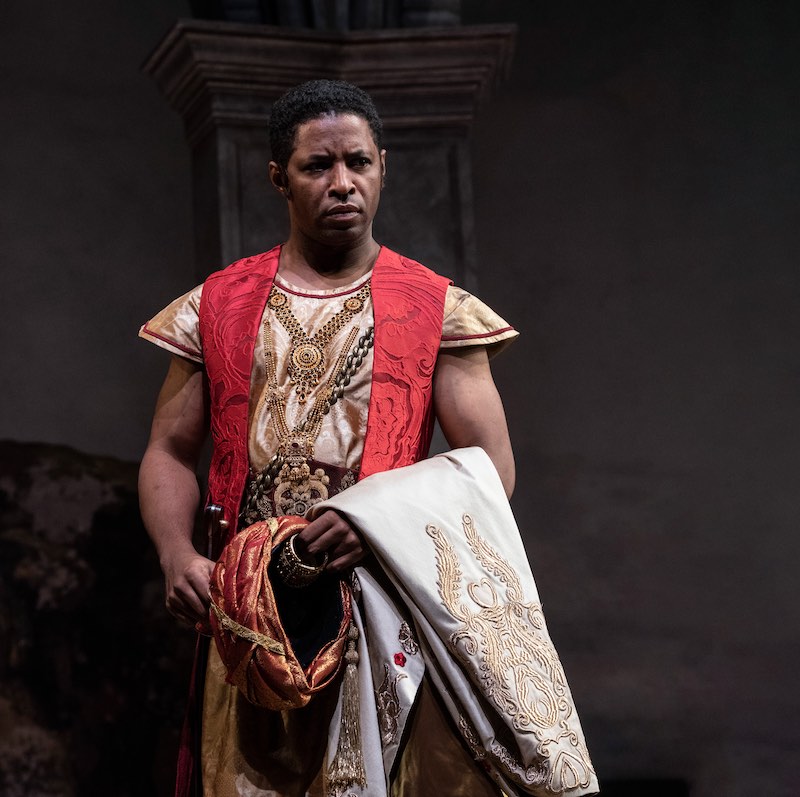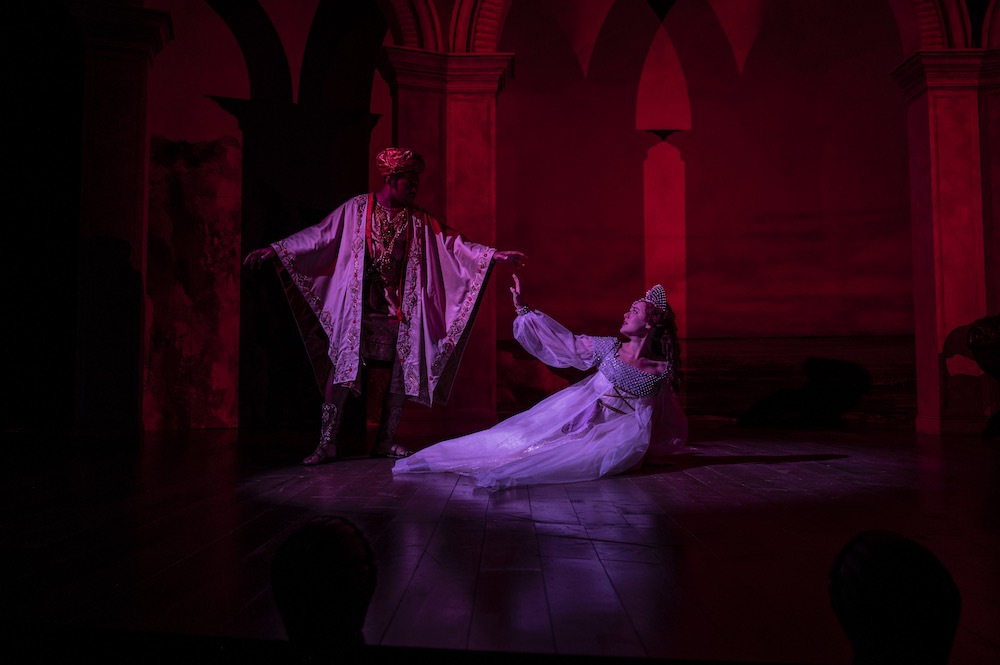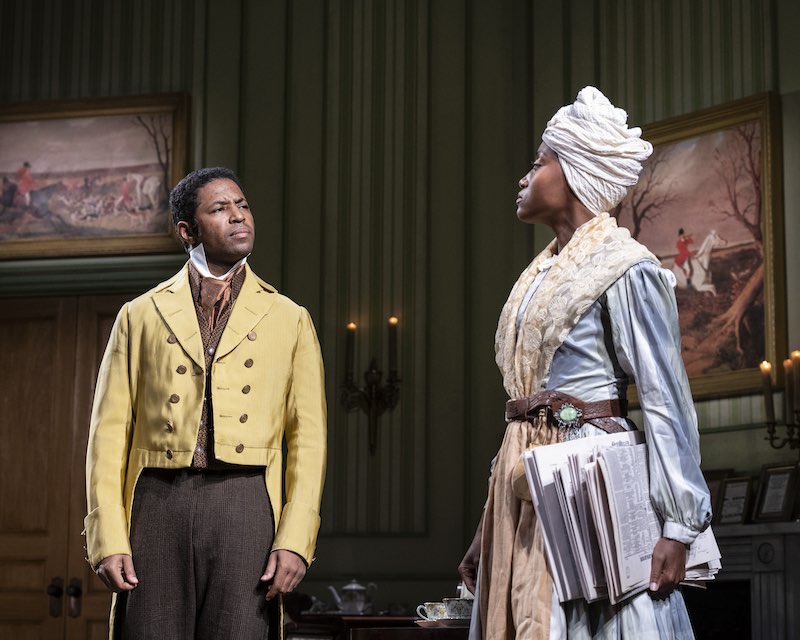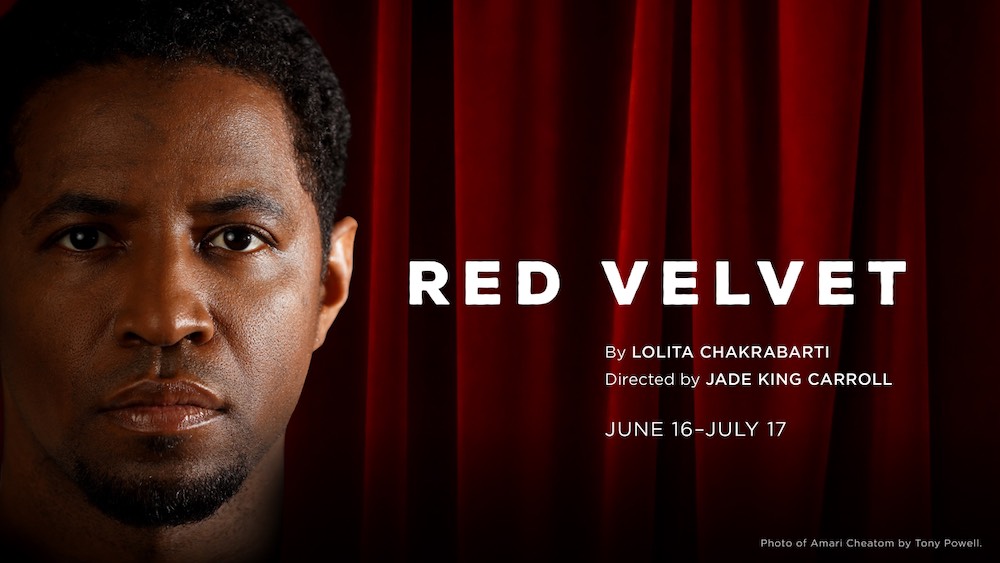“When a true genius appears in the world, you may know him by this sign, that all the dunces are in a confederacy against him.” —Jonathan Swift
Ira Aldridge was the first classical Black actor—and the first American actor—to achieve international fame. A leading interpreter of Shakespeare, he played Othello, Shylock, Macbeth, and King Lear. He knew many celebrities of his time, from Hans Christian Andersen to Charles Dickens to Franz Liszt and Jenny Lind. Sadly, there was no place for this great actor on the American stage, but he performed all over the world, in Europe, Britain, Ukraine, the Netherlands, even Russia. He was billed as the “African Roscius,” after the former slave and Roman actor.

Lolita Chakrabarti (Life of Pi) is an award-winning actress and playwright. Her acclaimed Red Velvet focuses on a central incident in Aldridge’s life: his appearance as Othello at Covent Garden, 1833. In London at the time, the idea of a Black actor playing Shakespeare was considered a joke. And Covent Garden was a high-stakes venue: If you succeeded, many opportunities would open up. If you failed, you would very likely fade into obscurity.

Today, perhaps, despite the systemic racism that surrounds us, Aldridge would have played a wider variety of Shakespearean roles: Hamlet, Prospero, and any number of romantic leads. Or he would have been a movie star like Denzel Washington. But in his time, he triumphed against impossible odds. Director Jade King Carroll (in her STC debut), along with a spectacular creative team and an extraordinary group of actors, brings us a production worthy of Aldridge’s remarkable achievement.
Amari Cheatom as Aldridge gives a performance of unparalleled skill and insight, which builds to a breathtaking climax. There are scenes from Othello interspersed throughout. It is fascinating to watch him as a working actor as he and his Desdemona (Emily DeForest, playing a real actress of the time, Ellen Tree) struggle with wildly different acting styles, efforts to build trust, and the fact that no one seems to want them to be there in the first place.
We first see Aldridge in old age, preparing to play King Lear in whiteface. At stage left is his costume: a magnificent red, white, and gold creation.
It is Lodz, Poland, 1867. He rushes out of the rain into his opulent dressing room. He is met by his long-suffering assistant, Terence (David Bishins), who has carried in his suitcase. A young female journalist, Halina Wozniak (Kimberly Gilbert), has been sneaked in by a smitten stage hand, Casimir (Samuel Adams). Aldridge is not pleased. When Halina presses him as to why he has not returned to Covent Garden, he throws her out.
The next scene takes place in London, 1833, on the stage at the Theatre Royal, Covent Garden. It is a time of political chaos; protesters are chanting outside, accompanied by police. Two young actors, Betty Lovell (Kimberly Gilbert) and Henry Forrester (Samuel Adams), along with an older performer, Bernard Warde (David Bishins), are arguing about the Slavery Abolition Act (1833), which abolished slavery in most British colonies. The great tragedian Edmund Kean has collapsed on stage, and they are in desperate need of an Othello. A Jamaican woman, Connie (Shannon Dorsey), serves them with impassive grace.
Charles Kean (Jaye Ayres-Brown), son of Edmund, arrives with his fiancée, actress Ellen Tree (Emily DeForest), who is Desdemona. He assumes he will move up from his current role, Iago, to the lead, and is taken aback when enterprising theater manager Pierre Laporte (superbly played by Michael Glenn) explains that he has asked Ira Aldridge, the toast of many a production, to take on Othello. Reactions are mixed.
Ira puts Charles Kean’s back up by making suggestions about his Iago, something that actors from time immemorial have resented. The reviews (we hear mercifully few of them) are largely profoundly racist and misguided. Charles, stuck with the advantages and tribulations of being the child of a genius, as well as his own considerable prejudices, believes he should be leading the company.
In the dual roles of Casimir and actor Henry Forrester, Samuel Adams brings a refreshing energy and range. Jaye Ayres-Brown’s Charles Kean is carefully shaded, a clever portrait of a man undone by his own sense of privilege. David Bishins, as the older actor Bernard Warde, gives a fine account of a certain type of early-stage blowhard; as Aldridge’s assistant, Terence, he reminds us of every efficient yet overwhelmed PA we have ever known.

Emily DeForest as Ellen Tree excels both as Desdemona and as the hard-working actress who is determined to succeed in her role. Shannon Dorsey’s Connie is brilliantly honest; one of the few people who dare to tell Aldridge the truth, she reminds him in no uncertain terms that people see what they want to see.
The final argument between Michael Glenn’s Pierre Laporte and Cheatom’s Aldridge is one of the highlights of the performance. The double standard by which a Black actor of his time was judged has never been so clear.
Kimberly Gilbert is charming as the sincere but embattled journalist; her turns as actress Betty Lovell and Aldridge’s devoted wife, Margaret, are equally nuanced and appealing.
The costumes by Rodrigo Muñoz cover an astonishing range of epochs and situations and are exceptionally beautiful. Scenic Designer You-Shin Chen’s sets, sumptuous and ever-changing, are simply a marvel. Lighting Designer Yuki Nakase Link’s lavish talents utilize both light and shadow. Karin Graybash’s mastery as both sound designer and composer is equally impressive, rounding out the creative dream team.
In the end, there is a cry of agony from Aldridge, which reaches from the stage all the way to the back of the theater. “They told me I was everything,” Aldridge quotes from King Lear. “’Tis a lie.”
Running Time: Two hours and 40 minutes, with one 15-minute intermission.
Red Velvet plays through July 17, 2022, at Shakespeare Theatre Company’s Michael R. Klein Theatre (formerly the Lansburgh), 450 7th Street NW, Washington, DC. To purchase tickets ($35–$112), visit ShakespeareTheatre.org or call the Box Office at (202) 547-1122.
The Asides mobile program for Red Velvet is online here.
COVID Safety: Patrons must provide proof that they are fully vaccinated against COVID-19 in order to attend any performance or public event at Shakespeare Theatre Company. Masks are required for all guests inside, except while eating or drinking in designated locations. For full guidelines, visit the theater’s Health and Safety page.
RED VELVET
By Lolita Chakrabarti
Directed by Jade King Carroll
CAST
Casimir/Henry Forrester: Samuel Adams
Charles Kean: Jaye Ayres-Brown
Terence/Bernard Warde: David Bishins
Ira Aldridge: Amari Cheatom
Ellen Tree: Emily DeForest
Connie: Shannon Dorsey
Pierre Laporte: Michael Glenn
Helena Wozniak/Betty Lovell/Margaret Aldridge: Kimberly Gilbert
CREATIVE AND PRODUCTION TEAM
Scenic Designer: You-Shin Chen
Costume Designer: Rodrigo Muñoz
Lighting Designer: Yuki Nakase Link
Sound Designer & Composer: Karin Graybash
Wig Designer: Danna Rosedahl
Resident Casting Director: Danica Rodriguez
Dramaturgy: Dr. Soyica Colbert, Dr. Drew Lichtenberg
Fight/Intimacy Captain: Samuel Adams
Voice & Text Coaches: Lisa Beley, Kim James Bey
Fight & Intimacy Consultant: Sierra Young
Assistant Directors: Jacob Ettkin, Max J. Kelly
Production Stage Manager: Anthony O. Bullock
Assistant Stage Manager: Samantha Wilhelm
SHAKESPEARE THEATRE COMPANY
Artistic Director: Simon Godwin
Executive Director: Chris Jennings





